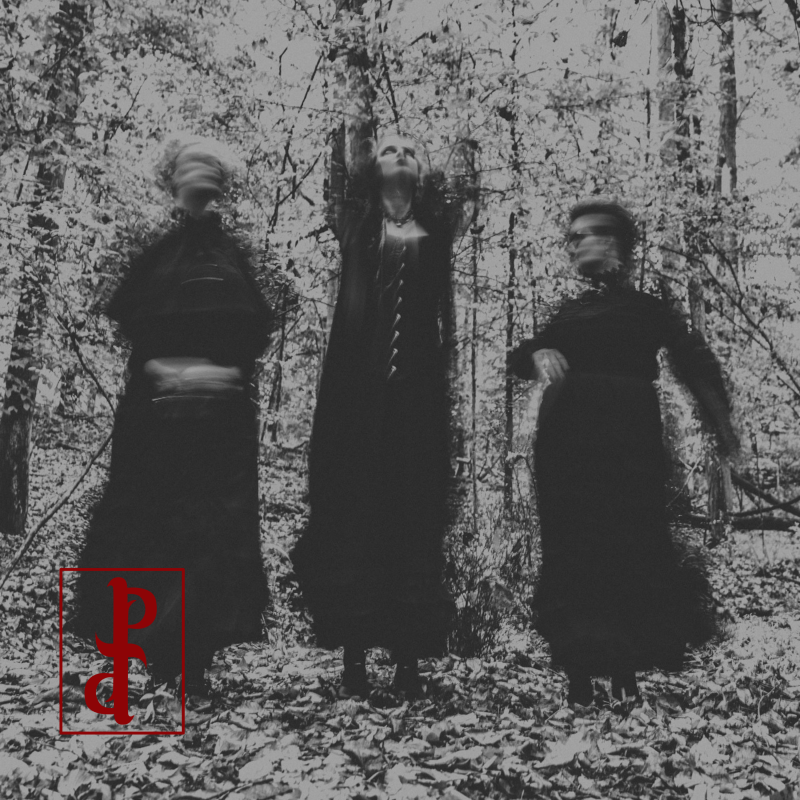The post Music for a Victorian Funeral Parlour — Listen to the Dark Folk Cabaret of Please Don’t Tell’s Self-Titled Debut appeared first on Post-Punk.com.
]]>Watch us dance as our feet fall apart
Don’t we make the prettiest picture
Radium ladies glow in the dark
The delightfully enigmatic Please Don’t Tell stands cloaked in the allure of a secret too compelling to keep. Nestled in the quaint embrace of Charlottesville, VA, this trio’s repertoire, a whimsical blend of nocturnal worries, folkloric charm, and the kind of mischief one might expect in a dimly lit Victorian parlour, emerges from an unlikely medley of acoustic instruments. And yet, for all the spectral echoes of yesteryear that dance beneath their tunes, there’s a timeless quality to their music, suggesting it might have effortlessly found its place in the annals of history, serenading an era that never knew it needed them, without so much as a discordant whisper.
At the helm of this clandestine affair is Christina Fleming, a master of melody who doubles as both the lead vocalist and pianist, crafting tunes that beckon the listener closer with the promise of untold tales. For a fleeting moment, the ensemble blossomed into a trio, with Nicole Rimel’s cello and Anna Hennessy’s violin and vocals adding layers to their one-night symphony, an arrangement so enchanting it stubbornly refused to disband.
In the absence of drums, the ensemble finds its rhythm in Fleming’s dynamic piano play and her expansive operatic voice, a combination that fills the air with an unexpected vibrancy. The trio, with their eclectic backgrounds, converge in a sound that looms large, drawing from the grandeur of classical and choral music, the dark allure of goth club nights, and the earthy undertones of bluegrass that whisper of their Central Virginia roots. The revelation that these musicians are as at home in the gritty ambiance of underground punk venues as they are under the refined lights of The Kennedy Center should hardly raise an eyebrow among those tuned in to their diverse range.
The lyrics of their songs oscillate between the compelling tales of remarkable women and intimate contemplations, unearthing the sort of stinging quips that are typically concealed within adversity. At times, they abandon any guise of humor, confronting the listener with the stark, unvarnished truths of Fleming’s musings on our precarious human condition. Yet, more often than not, the somber themes are laced with a sharp, modern wit that deftly targets tyrannical spouses and dissects the mental dilemmas pervasive in today’s society. The group’s sound is profoundly shaped by their eclectic musical tastes, which span a broad spectrum from Mozart and Rasputina to Kurt Weill, Tom Waits, Cab Calloway, and Edith Piaf. This diverse palette informs their modern chamber-pop aesthetic, evoking parallels with acts like The Divine Comedy, Duke Special, and Rufus Wainwright. Their unique approach to music embraces a gothic romanticism, infused with whimsy and charm, and is reminiscent of a Sweeney Todd-like twist, sugarcoating blistering melancholy with enchantment, whimsy and Schoenhut toy pianos.
This brilliant, bizarre album opens with Nearsighted, which expresses a deep sense of internal emptiness and loss, likening the singer’s soul to a desolate graveyard. This internal landscape is marked by a profound stillness and the absence of pain, but also by loneliness and a longing for connection, symbolized by the contrast between wild roses and neglected graves. The video for the chilling Heave Ho, directed by Mariah Johnson, asks us to examine our realities: is the dear widower in the clip being supported by care givers, haunted by spirits, or drowning his own grief? Was it all a dream?
Blueshift depicts a preference for the night over the day, highlighting the night’s comforting embrace that harbours the singer’s fears and dreams. Contrasting the day’s harshness, the night’s gentle nature offers solace and an attentive ear, embodying a peaceful sanctuary where the moonlight transforms perception, casting everything in a serene, blue hue.
The lyrics to the tragic The March of Grace Fryer poignantly reflect the horrible story of the “Radium Girls,” who were factory watch dial painters who suffered from radium poisoning from the glow in the dark paints they used. Their initial pride transformed into a harrowing reality of physical decay, yet they ironically maintain a haunting elegance. The song critiques societal attitudes towards their plight and the dismissive justifications for their suffering, ultimately depicting them as glowing, disintegrating specters, reminders of a grave injustice. This danse macabre is a reminder that these workplace injustices persist today, and these little ghosts serve as a warning tale.
The lyrics of St James Infirmary depict a mournful visit to a lover’s final resting place, evoking a mix of sorrow and bravado. The narrator requests an extravagant funeral, reflecting a life lived with flair. Amidst the somber setting, there’s a defiant celebration of the self, with the recurring wish for the departed to find peace, yet underscored by the narrator’s assertion of their irreplaceability.
Follow Please Don’t Tell:

The post Music for a Victorian Funeral Parlour — Listen to the Dark Folk Cabaret of Please Don’t Tell’s Self-Titled Debut appeared first on Post-Punk.com.
]]>